Edwin
more unofficial biog info
Back to official biog
Edwin was three years old when his family moved to Cleveland, Ohio. During study hall
periods at Cunard Junior High School, he and several friends
would sit in strategic places around the room and sing all the
vocal parts to Frankie Lymon’s "Why Do Fools Fall In
Love." The teachers weren’t happy about it, but Starr
enjoyed singing so much, he got together with four of his friends
after school to form a group called the Future Tones.
They entered a local talent contest on a TV
show hosted by "Uncle Jake," and won five weeks in a
row. First prize was a Sealy Posturpedic mattress, which the
group somehow had to split five ways. Starr’s career plans
were interrupted by military service. When he was discharged
two-and-a-half years later, he found that the other group members
had little interest in singing professionally. So Starr sang in
local clubs, and was spotted by bandleader Bill Doggett
("Honky Tonk," 1956), who asked Edwin to tour with him.
The gig lasted two years, beginning in 1963.
In 1965, Starr signed with the Detroit-based
Ric-Tic label. His first hit, "Agent Double-O-Soul,"
reached #21 pop and #8 R&B that summer. It was followed in
early 1966 by "Back Street" (#95 pop, #33 R&B) and
"Stop Her On Sight (S.O.S.)" (#48 pop, #9 R&B).
Starr also was responsible for three singles that entered the Billboard
Hot 100 on May 7, 1966: the Shades of Blue’s "Oh How
Happy," which he wrote and produced; his own recording of
"Headline News"; and "I’ll Love You
Forever," which the Golden World label released under the
name of the Holidays.
On the strength of "Stop Her On
Sight," Starr toured Great Britain in 1966. Upon the
completion of his tour, he flew directly to New York to appear at
the Apollo Theater with the Temptations. When he arrived, one of
the Tempts welcomed Starr to the "family." When he
asked what family he was being welcomed to, Starr was advised
that he was now a Motown artist as Ric-Tic and its parent label,
Golden World, had both been sold to Berry Gordy. Finding that
hard to believe, Starr immediately telephoned the Golden World
offices in Detroit, only to hear the receptionist answer,
"Motown Records."
Unfortunately for Starr, he found himself in
contract negotiations for the next two-and-a-half years, during
which time he recorded nothing. Finally, in late 1968, he
appeared on a local TV show called "20 Grand," and
performed a song he had written three years earlier titled
"25 Miles." Some people from Motown saw Starr on TV and
asked if he would like to record the song. Released on
Motown’s Gordy subsidiary, the single peaked at #6 on both
the pop and R&B charts in the spring of 1969. Motown then
released the 25 Miles album, which featured Starr’s
follow-up single, "I’m Still A Struggling Man"
(#80 pop, #27 R&B).
In early 1970, the Temptations released their Psychedelic
Shack LP, which featured a protest song called
"War." Motown received hundreds of letters, many from
college students, urging the label to release "War" as
a single. Since Motown had other plans for the Tempts, producer
Norman Whitfield asked Starr to record the song. As he
hadn’t waxed anything in six months, Starr was happy just to
get back into the recording studio.
The song that music journalist Dave Marsh
called "half soul, half psychedelic freak out" debuted
on the Billboard Hot 100 on July 11, 1970, and entered the
R&B chart a week later. By August 29th,
"War" was the #1 pop song in America. Interestingly, it
never rose any higher than #3 R&B. Edwin Starr won a Grammy
for Best Male R&B Vocal Performance. The follow-up was
another Whitfield production, "Stop The War Now."
Little more than a cynical attempt to cash in on the success of
its predecessor, the single nonetheless managed #26 pop and #5
R&B in early 1971.
Starr remained with Motown through the
mid-1970s, although he moved from Gordy to the Soul subsidiary,
on which he charted with "There You Go" in 1973. On
Motown itself, Starr made the R&B top thirty in 1975 with
"Pain." Later that year, he moved on to the Granite
label, and made the R&B charts three times through 1976. A
subsequent move to 20th Century produced the 1979
disco smash, "Contact," and its successful follow-up,
"H.A.P.P.Y. Radio."
SOURCES: Fred Bronson, The Billboard
Book of #1 Hits; Dave Marsh, The Heart of Rock and Soul
Back to official biog
|

